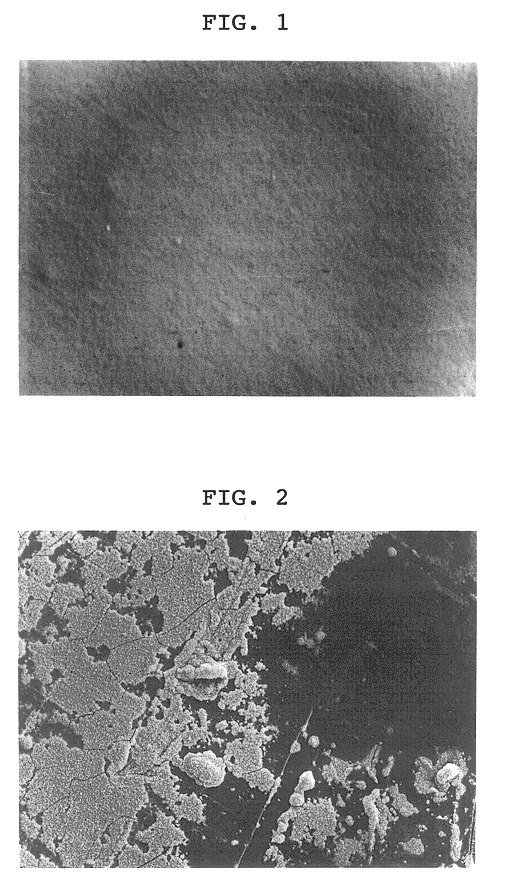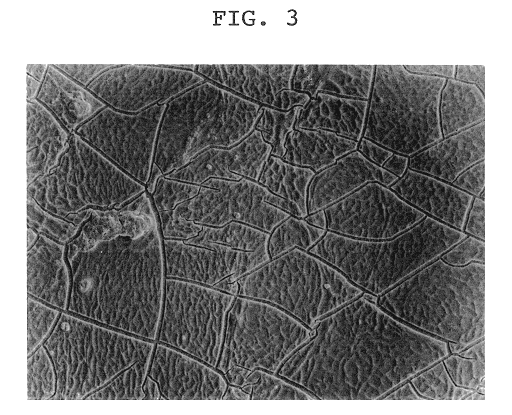Method for preparing hydroxyapatite composite and biocompatible material
a technology of hydroxyapatite and biocompatible materials, which is applied in the field of preparing hydroxyapatite composites and biocompatible materials, can solve the problems of insufficient bonding strength of the obtained hap to the polymer matrix, the growth speed of hap is so slow, and the amount of hap on the polymer matrix is not sufficient,
- Summary
- Abstract
- Description
- Claims
- Application Information
AI Technical Summary
Benefits of technology
Problems solved by technology
Method used
Image
Examples
example 1
Three pieces of 5.times.6 cm PE film manufactured by SHOWA DENKO K.K. were subjected to corona treatment at 15 kV for 2 minutes, 5 minutes, and 10 minutes, respectively, to obtain three kinds of PE film matrices that had been made hydrophilic on their surface. Each matrix was soaked in 10 ml of a 200 mM CaCl.sub.2 / Tris-HCl solution (pH 7.4, temperature at 37.degree. C.) for one minute, washed with pure water on its surface, soaked in acetone, and air-dried. A series of these operations including the soaking of the matrix in the calcium ion aqueous solution is referred to as soaking operation (i). Subsequently, each matrix was soaked in 10 ml of a 120 mM Na.sub.2 HPO.sub.4 solution (temperature at 37.degree. C.) for one minute, washed with pure water on its surface, soaked in acetone, and air-dried. A series of these operations including the soaking of the matrix in the phosphate ion aqueous solution is referred to as soaking operation (ii).
A cycle of the alternate soaking process c...
example 2
HAp was formed in the same way as in Example 1 except that the corona-treated PE film matrix was replaced with a PE film matrix that had been made hydrophilic on its surface by soaking PE film in sulfuric acid for 10 minutes for acid treatment. The resulting HAp composite was subjected to the measurement of the HAp amount and the Exfoliation Test in the same way as in Comparative Example 1. The results are shown in Table 1.
example 3
HAp was formed in the same way as in Example 1 except that the corona-treated PE film matrix was replaced with a PE film matrix that had been made hydrophilic on its surface by rubbing PE film surface with a P400 file in two diagonal directions each for 50 times and in total of 100 times for surface-filing treatment. The resulting HAp composite was subjected to the measurement of the HAp amount and the Exfoliation Test in the same way as in Comparative Example 1. The results are shown in Table 1.
PUM
| Property | Measurement | Unit |
|---|---|---|
| temperature | aaaaa | aaaaa |
| temperature | aaaaa | aaaaa |
| thick | aaaaa | aaaaa |
Abstract
Description
Claims
Application Information
 Login to View More
Login to View More - R&D
- Intellectual Property
- Life Sciences
- Materials
- Tech Scout
- Unparalleled Data Quality
- Higher Quality Content
- 60% Fewer Hallucinations
Browse by: Latest US Patents, China's latest patents, Technical Efficacy Thesaurus, Application Domain, Technology Topic, Popular Technical Reports.
© 2025 PatSnap. All rights reserved.Legal|Privacy policy|Modern Slavery Act Transparency Statement|Sitemap|About US| Contact US: help@patsnap.com


